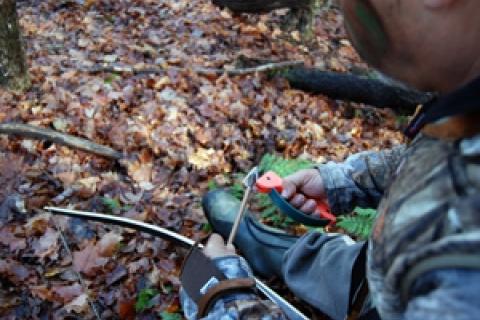
 A razor-sharp, well-designed broadhead is arguably the most important component in any bowhunting set up. One that is scary sharp will kill deer, even out of the lightest bow, all day long. In fact, this is so important that I’d rather hunt with a razor-sharp, well-designed broadhead out of a 40-pound bow than spoon-dull one shot from a 70-pounder. Forced to make that choice, I believe every knowledgeable bowhunters would.
A razor-sharp, well-designed broadhead is arguably the most important component in any bowhunting set up. One that is scary sharp will kill deer, even out of the lightest bow, all day long. In fact, this is so important that I’d rather hunt with a razor-sharp, well-designed broadhead out of a 40-pound bow than spoon-dull one shot from a 70-pounder. Forced to make that choice, I believe every knowledgeable bowhunters would.
The benefits of a sharp broadhead cannot be understated. First, they promote maximum arrow penetration. The advantages of this are simple: the more cross-section of a deer you are cutting through, all other things being equal, the more bleeding. That's critical because, generally speaking, bow-killed deer die from blood loss. On the flip side, you greatly lessen the chance of pass-throughs and deep penetration with dull blades.
More importantly, a very sharp broadhead leaves a clean cut which means better blood trails and, typically, quicker expiry of the animal.
This should come as no revelation to any experienced bowhunter. But I think it needs repeating because, in this day and age of factory sharpened, replaceable broadheads, we forget to check those broadheads regularly to ensure that they are still out-of-the-box keen. That’s something that was second nature to the bowhunters of old, by the way.
So many things can take the edge off of a razor sharp broadhead — contact with other arrows in the quiver, improper storage, a few practice shots at a target, or even rust to name a few.
It’s my sincere belief that the traditional archer in particular needs scary sharp broadheads — the kind that will shave hair off your arm — because these mitigate the disadvantages of lower poundages we often shoot and slower arrow speeds we deal with.
I prefer a two-blade broadhead with chisel tip and small bleeder blades, but that’s just me. There are many good designs out there that have a longstanding track record on big game. Do your research and choose carefully. So long as you buy a proven broadhead that flies well out of your bow and stands up reasonably well to bone, you are probably on the right track.
I would also suggest that when choosing such a blade, you have a closer look at it to consider how difficult it will be to re-sharpen. These days, that can be as simple as installing replacement blades but on many models, such as the one I use, you can actually sharpen them yourself, which is a real plus, and, if need be, replace the blades.
I test my broadheads for sharpness before each hunt and touch them up as required, as you should too. It’s a very small and, I find, enjoyable task that gives me peace of mind, knowing that I’m only shooting truly deadly broadhead-tipped arrows at any game I target.
That goes a long way towards putting venison in the freezer. So stay sharp. It's the bowhunter's motto.
- 3787 views

